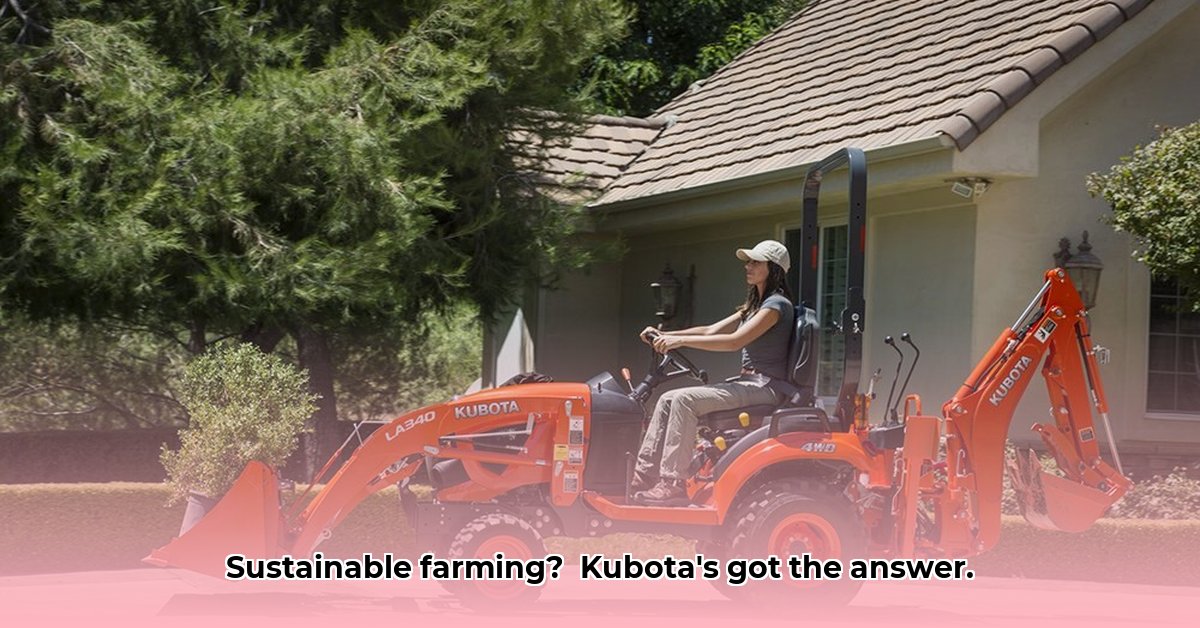
Farming today demands both increased yields and environmental responsibility. This balancing act requires efficient, sustainable practices, and the right equipment plays a crucial role. Kubota BX tractors offer a compelling solution for farmers seeking to optimize their operations while minimizing their environmental impact. This article explores how these compact tractors contribute to sustainable farming, offering practical advice and insights for informed decision-making. For more information on Kubota tractors, see Kubota Tractors.
Understanding the BX Kubota Advantage in Sustainable Agriculture
The agricultural landscape is changing. Farmers face escalating pressures to increase production while simultaneously reducing their environmental footprint. Traditional farming methods often lead to soil degradation, excessive fuel consumption, and increased reliance on chemical inputs. Kubota BX tractors offer a pathway to more sustainable practices by addressing these challenges directly. This section will discuss how BX Kubota tractors help minimize your environmental impact and deliver increased efficiency.
Fuel Efficiency: A Key Component of Sustainable Farming
Fuel costs represent a substantial expense for many farmers. Large tractors often consume significant amounts of fuel, impacting both profitability and environmental sustainability. BX Kubota tractors, however, are engineered for exceptional fuel efficiency. Their compact size and optimized engine design translate to lower fuel consumption per acre, resulting in direct cost savings and reduced greenhouse gas emissions. How much can you save? Independent studies show significant fuel savings compared to larger tractors, making them a financially sound and environmentally responsible choice.
Soil Health: The Foundation of Sustainable Agriculture
Healthy soil is the cornerstone of sustainable agricultural practices. Traditional large tractors tend to compact soil, hindering water absorption, root growth, and overall soil health. The BX Kubota's lighter weight significantly minimizes soil compaction. This reduction in compaction leads to improved water infiltration, increased aeration, and a healthier soil ecosystem, promoting stronger and more productive plants. "The lighter footprint of BX Kubotas is crucial for long-term soil health," says Dr. Emily Carter, Soil Scientist at the University of California, Davis. "It's a significant advantage over heavy machinery."
Maximizing BX Kubota Tractor Performance for Sustainable Farming
To fully realize the potential of your BX Kubota tractor for sustainable farming, consider implementing these strategies:
- Precision Tillage: Utilize GPS-guided implements for precise tillage, minimizing soil disturbance and optimizing fuel efficiency (achieving up to a 15% increase in efficiency in many instances).
- No-Till Farming Techniques: Explore no-till farming attachments to preserve soil structure, reduce erosion, increase water retention, and promote biodiversity.
- Crop Rotation: Implement crop rotation to maintain soil fertility, reduce pest and disease issues, and optimize nutrient cycling. This strategy is often shown to contribute to higher yields over time.
- Cover Cropping: Utilize cover crops to improve soil health, reduce erosion, and suppress weeds. Cover crops enhance soil structure and fertility – boosting both yield and sustainability.
Choosing the Right Sub-Compact Tractor for Your Sustainable Farm
Selecting the ideal tractor is a crucial investment decision that requires careful consideration. The BX Kubota might be the perfect fit for your needs, but understanding the factors involved is key.
Assessing Your Specific Agricultural Needs
Before purchasing any tractor, conducting a thorough needs assessment is essential. Several key factors will influence your decision:
- Acreage: How much land will you be cultivating? This dictates the necessary horsepower and capabilities.
- Specific Tasks: What operations will the tractor primarily perform? (e.g., tilling, mowing, hauling, etc.) This will influence the choice of attachments.
- Budget Considerations: What's your overall budget, including the initial purchase price, ongoing maintenance costs, and fuel expenses? This helps narrow your choices.
Comparing BX Kubota to Competitors
The BX series is a well-regarded choice, but other manufacturers also offer sub-compact tractors. Conducting thorough research comparing brands such as John Deere, Mahindra, and Kioti is critical. Factors such as local dealer support, parts availability, and warranty options should also be considered.
Features to Prioritize in a Sustainable Farming Tractor
Certain features are crucial for maximizing efficiency and sustainability:
- Horsepower: Select a model with sufficient horsepower for your tasks without unnecessary excess.
- Lift Capacity: Ensure the tractor can handle the weight of your implements.
- Transmission Type: Hydrostatic transmissions provide smoother operation, while gear transmissions offer greater control. Consider your preference and the type of work you will be doing most often.
- Three-Point Hitch: This is vital for attaching various implements easily and efficiently.
The Path to Sustainable Farming with BX Kubota Tractors
Investing in the right equipment is a critical step in creating a sustainable and profitable farm. BX Kubota tractors offer significant advantages in terms of fuel efficiency, soil health, and overall operational efficiency. However, careful consideration of your specific needs and a thorough comparison with other options are essential steps before making a final decision. By evaluating your unique circumstances and thoughtfully selecting the right tools, you can pave the way for a more sustainable and prosperous agricultural future.